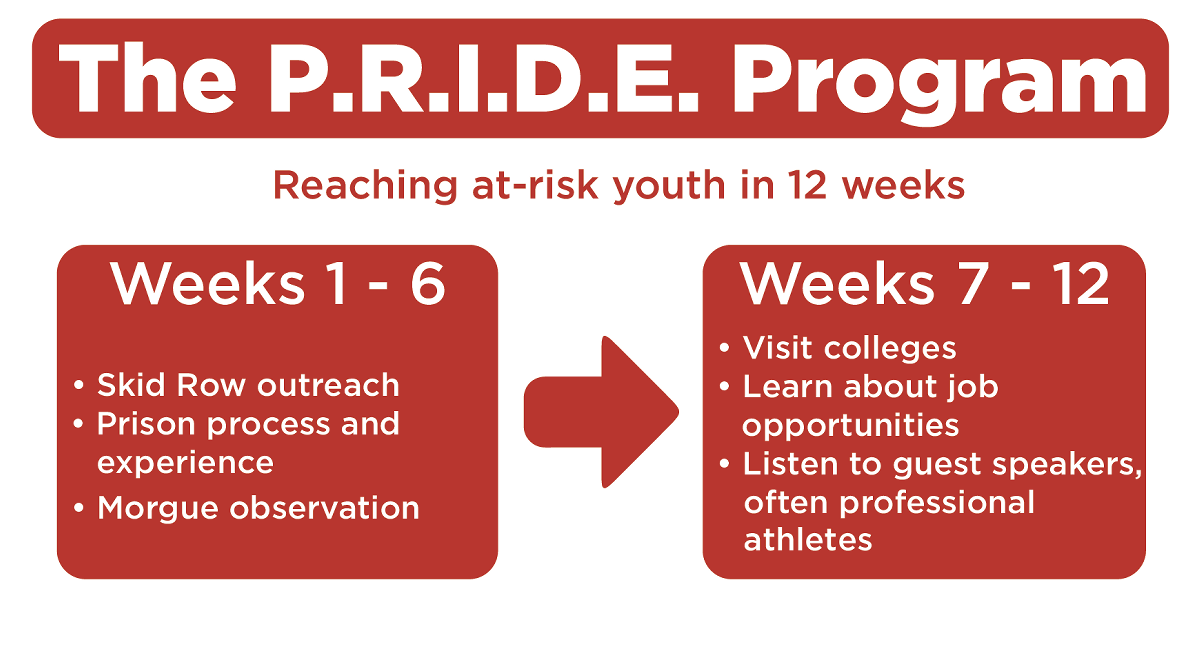
Biola’s 3D Ministries is partnering with the Norwalk Sheriff’s Department and P.R.I.D.E. Youth Intervention Program to change the lives of at-risk youth in Los Angeles County. The partnership gives students the opportunity to work directly with program participants, many of whom are just a few choices away from homelessness, imprisonment or death.
The new partnership with the P.R.I.D.E. program is part of 3D Ministries’ mission to connect students to the vulnerable and at-risk youth population surrounding the university.
“Our desire is for Biola students to minister to the kids in our backyard,” said senior psychology major and 3D Ministries leader Tony Castorena.
FAITH AND SERVICE
The faith-based intervention program, whose acronym stands for Personal Responsibility in Development and Ethics, serves at-risk youths from the ages of 12 to 17.
“They are either considering drugs or on drugs, considering gangs or in gangs,” said P.R.I.D.E. program coordinator Mercedez Quintanilla. “They’re defying their parents and failing school. They come from dysfunctional families or broken homes.”
According to Quintanilla, who has worked with the program for six years, the 12-week curriculum is designed to offer a “wake up call” to the kids and open their eyes to the opportunities they will have if they change their behavior.
“We tell them, ‘This is where you are today: you’re failing school, caught up in gangs. You will end up in one of three places — dead, in prison or on Skid Row. However, you do have a chance to be successful,’” Quintanilla said.
The program does not simply tell participants the dangers of risky behavior; they are required to walk through the grim potential outcomes. Through the first six weeks of the program, participants visit Skid Row, a prison and a morgue. They are acquainted with the harsh realities of homelessness, confinement and death.
According to Tom Jones, director of the P.R.I.D.E. Program, the hardship they encounter as they are confronted with reality is nothing new. Many have experienced or know someone who has experienced the consequences of drug use, crime or gang violence.
“They’ve experienced it, but they’ve never mourned. So we start to break down those walls [through the program],” Jones said.
A NEW START
Through the second six weeks of the program, participants are introduced to the opportunities available if they change their behavior.
“We start working to build them back up,” Jones said. “We introduce more things like the possibility to go to college and what they could gain after going to college. We bring in positive role models. Oftentimes, we bring in a professional athlete.”
Participants are paired with mentors, who provide support and counsel throughout the program.
By the end of the 12 weeks, according to Jones, the dramatic change in the lives of participants is evident.
“By the end of the program, the kids come to love us,” he said. “The first day, they don’t want anything to do with us. But by the end, they just want to come back.”
On March 1, 3D Ministries worked with the P.R.I.D.E. program, the Mosaic Cultural Center and other ministries to celebrate the success of participants who recently completed the program. The celebration brought together current students, alumni, faculty and program participants in the Mosaic Cultural Center. It included music, testimonies and a time of fellowship over root beer floats.
As the P.R.I.D.E. program partnership develops, Jones hopes students will become more involved.
“For students who are going into social work or psychology or pastoral ministry, we’d like to offer them opportunities to do clinical time, complete internships and help with the kids,” he said. “They can go with us on the home visits. They can help with counseling. They can offer their services to the parents.”







